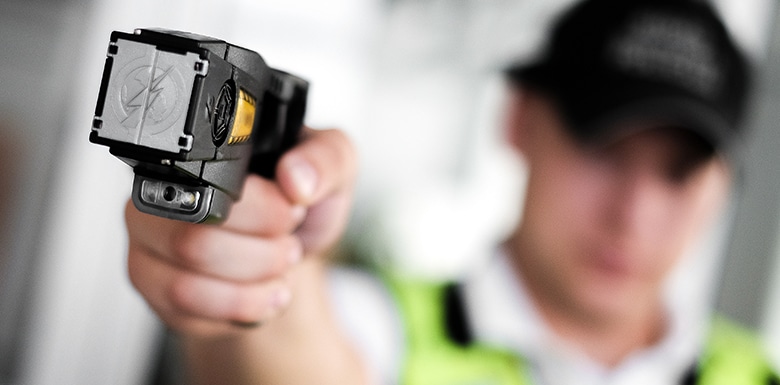When EXACTLY Should Philly Police Use Tasers?
Nov 10 2020, by in Criminal Defense, Firearms/Weapons, Legal Blog, Technology & Law
Tasers are electrically powered weapons used to shock or stun the target. Though they can be lethal, they’re viewed as a way for the police to control someone that’s less likely to kill than a firearm.
Given the community’s outrage at the killing of Walter Wallace by the Philadelphia police, and the fact officers at the scene didn’t have Tasers, their availability and use are getting well-deserved attention.
Could Walter Wallace’s Death Been Avoided?
According to reports, Wallace had a severe mental health episode on October 26, 2020, when his family called 911. Police arrived and based on reports and the police bodycam footage, which was released last week, Wallace approached officers with a knife, refused to comply with requests, and was ultimately shot several times.
As a result, this tragedy is being held up as an example by some of exactly when an officer could have used a Taser in place of deadly force.
Tasers in Philly
Philadelphia has about 4,500 patrol officers and the police department has 2,300 Tasers. More are expected to be purchased in the future.
CNN reports it’s department policy that “aggressive action” shouldn’t be used against a severely mentally disabled person unless there’s an “immediate threat to life or physical danger” to that person, an officer, or someone else present. Taser use is considered an intermediate use of force. Verbal commands are not considered force and using a firearm would be deadly force.
Taser Use vs. Firearms
In 2011 the Police Executive Research Forum and the US Department of Justice issued guidelines on using electronic control weapons (ECWs) like Tasers. Some of their “guiding principles” are:
- ECWs should only be used when needed, not as a convenience
- Officers shouldn’t rely too much on ECWs because there may be more effective and less risky alternatives
- Agencies using ECWs should comprehensively train officers on when and how to use them.
Their suggested rules include:
- ECWs should only be used against those showing active aggression or who are actively resisting in a way that is likely to cause injuries to officers or others
- ECWs shouldn’t be used against a passive subject
- Fleeing shouldn’t be the only reason for using an ECW. Before using one, officers should think about the severity of the possible offense, the potential threat the person poses to others, and the risk of a severe injury to the subject
- Officers should consider there’s a greater risk of sudden death in people using drugs and or disconnected to reality or out of control
- In general, pregnant women, elderly persons, young children, and visibly frail persons should not be ECW targets. Personnel should decide if using an ECW is reasonable, based on the situation, including the person’s age and physical condition.
- ECWs shouldn’t be used on handcuffed subjects unless it’s necessary to prevent them from causing serious bodily harm to themselves or others, and lesser attempts to control the person haven’t worked
- If the subject controls a vehicle in motion (including automobiles, trucks, motorcycles, ATVs, bicycles, and scooters) an ECW shouldn’t be used
- They also shouldn’t be used if a subject is in a position where a fall may cause substantial injury or death
Tasers May Prevent Harm in Philadelphia
Less use of lethal force by Philadelphia police would be a step in the right direction. Avoidable deaths destroy families, harm the community, and create more problems for the police and city as a whole.
Tasers by themselves won’t solve any problems. But if used in the right situations by well-meaning, properly trained officers, instead of firearms, everyone benefits.
Arrested or Charged? Call an Attorney
If you or a family member has been charged with a crime in the Philadelphia area or arrested at a local demonstration, it’s best to consult an experienced defense lawyer.
Attorney Michael Fienman of Fienman Defense understands what you’re dealing with and how to help. He can explain your rights and discuss how to resolve the issue in the best way possible. Call (215) 839-9529 for a free and confidential consultation 24/7.

